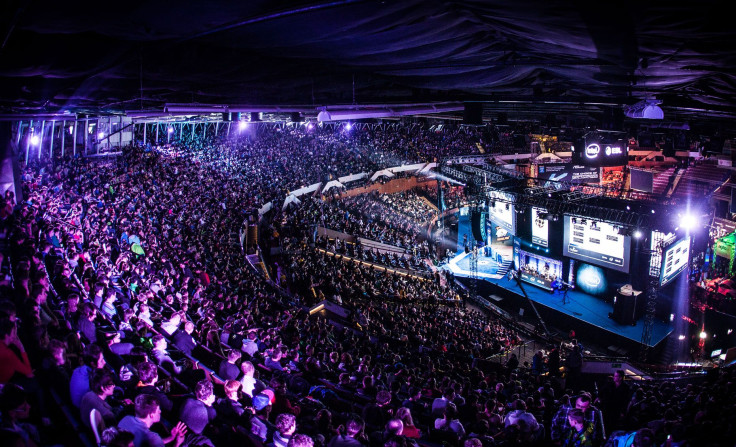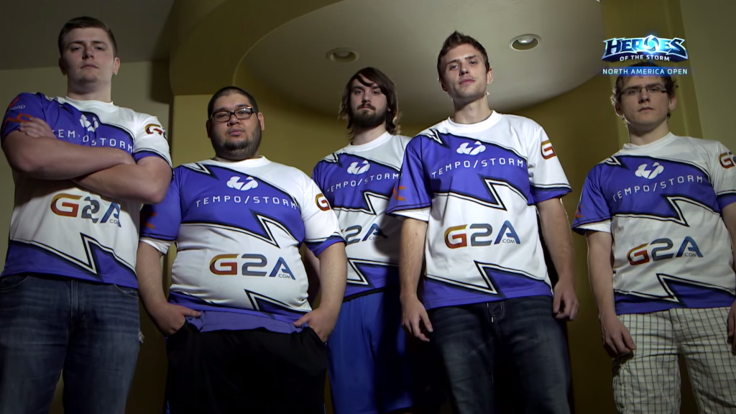PAX Prime: Pro Gamers Gird For Drug Testing In Seattle As MSI MGA Tournament For 'Heroes of the Storm' And 'StarCraft 2' Kicks Off

SEATTLE -- Barry Bonds. Alex Rodriguez. Lance Armstrong. Their names are as associated with performance-enhancing drugs as they are with the sports they dominated. But now drug testing is entering a brand new arena -- professional gaming -- and that's on the minds of pro players as they gather here as part of the MSI Masters Gaming Arena at the massive PAX Prime gaming convention in Seattle.
The Electronic Sports League, the main governing body for eSports, announced its plans to start drug testing on July 23, following a controversial interview with a “Counter Strike: Global Offensive” player who said his entire team was on the psychostimulant Adderall during a big ESL tournament. The list of banned substances is similar to the one for the Olympic Games, and include Adderall, cocaine and marijuana – for players who can’t prove a legal prescription. And as is the case in more-established big league sports like baseball, football and hockey, the players are wary.
Banned substances include substances not normally considered to be "performance-enhancing," such as alcohol and marijuana, but these aren't ordinary athletes. Unlike physical sports, the lifestyle that makes you a professional gamer -- little sleep, long hours on the couch, stress, repetitive motion -- doesn't exactly make you a healthy person. Some say the drug use rife among gamers is as much about managing stress as enhancing performance.
Competing live in front of an audience, with potentially millions more watching online, brings its own set of worries. “There are a lot of things that go into being in a LAN [Local Area Network, or an event where you're playing in the same room] -- your jitters, your stress, you’re tired because you didn’t sleep before,” said 20-year-old Taylor “Arthelon” Eder, a player for North American team Tempo Storm.

At the first major tournament to undergo drug testing, the “Counter Strike: Global Offensive” tournament in Cologne, Germany, Aug. 22-23, ESL performed random saliva drug testing of some players, releasing a statement that all tested players’ results came back negative but not saying how many people were tested, or the exact process -- although players are tested on site. ESL has not said whether players will be tested this weekend, but it could be a big issue for some players.
"I'm glad that ESL is taking measures to make this level of play completely fair. I personally don't want to see my opponents get disqualified, but at the same time it has to be taken seriously," says Cognitive Gaming's "Heroes of the Storm" player Austin "Shot" Lonsert, 20.
On Tuesday “Heroes of the Storm” teams from around the world, and players of “StarCraft 2,” started arriving in Seattle. Sources said a number of players immediately started trying to secure pot, calling people they know who live in the area and have dealers. Recreational use has been decriminalized in Seattle, with production and distribution regulated in a system similar to the state’s liquor controls. But use during the Masters Gaming Arena tournament is still against the rules.
“The consumption of drugs or alcohol is strictly forbidden during the event,” says ESL's player handbook for the competition. “Players who show up for matches or other official activities impaired or intoxicated may be removed from the tournament.”
To be clear, ESL only cares about use during the official tournament, not what players do beforehand or after. But with thousands of dollars, their reputations, and a possible future event ban on the line, it hardly seems worth it.
“It blows my mind that there are players who smoke all day at this high level of eSports,” said Cognitive Gaming’s “Heroes of the Storm” team manager, Dylan Walker, who doesn’t even drink. “Drugs and alcohol have an effect on your mood, no matter what. It clouds judgment and decision-making, and can lead to mood swings in some people.
“It seems like there are two groups here [in Seattle], the ones that want to go out and have a great time, and the others that want to maintain their edge through this whole weekend,” Walker said.
Eder said that drug testing is a good idea, because it evens out the competition, but he also said he doesn't think drugs like Adderall – which is more common in first-person shooter games like “Counter Strike” – make players any better; it just ensures that they are focused on the game.
Drug testing has been notoriously hard for sports leagues to regulate, and it is going to be no different for eSports. But they need to seem like they are doing something about it thanks to public statements from some players saying they have taken drugs during tournaments with big prize pools.
For the three North American “Heroes of the Storm” teams competing this weekend there is a lot on the line -- including $30,000 for first prize. Walker said that if any of the teams don’t do well, there could be roster changes in the following weeks – ahead of game publisher Blizzard Entertainment’s Americas Championship in September, which will see the winning teams go through to the World Championships for the first time. All three teams have already qualified for the Americas.
© Copyright IBTimes 2025. All rights reserved.



















